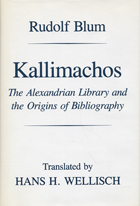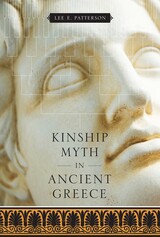4 start with K start with K

The famous library of Alexandria, founded around 295 BCE by Ptolemaios I, housed the greatest collection of texts in the ancient world and was a fertile site of Hellenistic scholarship. Rudolf Blum’s landmark study, originally published in German in 1977, argues that Kallimachos of Kyrene was not only the second director of the Alexandrian library but also the inventor of two essential scholarly tools still in use to this day: the library catalog and the “biobibliographical” reference work. Kallimachos expanded the library’s inventory lists into volumes called the Pinakes, which extensively described and categorized each work and became in effect a Greek national bibliography and the source and paradigm for most later bibliographic lists of Greek literature. Though the Pinakes have not survived, Blum attempts a detailed reconstruction of Kallimachos’s inventories and catalogs based on a careful analysis of surviving sources, which are presented here in full translation.

Heroic figures such as Heracles, Perseus, and Jason were seen by the Greeks not as mythical figures but as real people who in a bygone age traveled the world, settled new lands, and left descendants who, generation after generation, could trace their ancestry back to the "time of heroes." From the Homeric age to Byzantium, peoples and nations sharing the same fictive ancestry appealed to their kinship when forging military alliances, settling disputes, or negotiating trade connections. In this intriguing study of the political uses of perceived kinship, Christopher Jones gives us an unparalleled view of mythic belief in action.
Throughout the centuries of Greek preeminence, the Roman Republic and Empire, and into the early Christian era, examples of kinship diplomacy abound. Ancient historians report, for instance, that when the forces of Alexander the Great reached what is now southern Pakistan they encountered a people called the Siboi, whom they judged to be descendants of Heracles. Since Alexander was himself a descendant of the same hero, the invading Macedonians and the Siboi were clearly kinsmen and so parted in peace. Examining the very origins of ancient diplomacy, and kinship as one of its basic constituents, Kinship Diplomacy addresses fundamental questions about communal and national identity and sheds new light on the force of Greek mythic traditions.

In ancient Greece, interstate relations, such as in the formation of alliances, calls for assistance, exchanges of citizenship, and territorial conquest, were often grounded in mythical kinship. In these cases, the common ancestor was most often a legendary figure from whom both communities claimed descent.
In this detailed study, Lee E. Patterson elevates the current state of research on kinship myth to a consideration of the role it plays in the construction of political and cultural identity. He draws examples both from the literary and epigraphical records and shows the fundamental difference between the two. He also expands his study into the question of Greek credulity—how much of these founding myths did they actually believe, and how much was just a useful fiction for diplomatic relations? Of central importance is the authority the Greeks gave to myth, whether to elaborate narratives or to a simple acknowledgment of an ancestor. Most Greeks could readily accept ties of interstate kinship even when local origin narratives could not be reconciled smoothly or when myths used to explain the link between communities were only "discovered" upon the actual occasion of diplomacy, because such claims had been given authority in the collective memory of the Greeks.

As scholars have remarked, the word kleos in the Iliad and the Odyssey alike refers to something more substantive and complex than “fame” or “glory.” Kleos distinctly supposes an oral narrative—principally an “oral history,” a “life story” or ultimately an “oral tradition.” When broken down into its twin constituents, “words” and “actions” or “deeds,” a hero’s kleos serves to define him as a fully gendered social being.
This book is a meditation on this concept as expressed and experienced in the adult society Telemachos find himself in. Kleos is the yardstick by which his psychological change was appreciated by Homer’s audiences. As this book shows through philological and interdisciplinary analysis, Prince Telemachos grows up in the course of the Telemachy and arguably even beyond (in book 24): his education, which is conceived largely as an apprenticeship on land and sea, admits him gradually if unevenly to a full-fledged adult kleos—a kleos that nonetheless necessarily remains minor in comparison to that of his father and other elders.
READERS
Browse our collection.
PUBLISHERS
See BiblioVault's publisher services.
STUDENT SERVICES
Files for college accessibility offices.
UChicago Accessibility Resources
home | accessibility | search | about | contact us
BiblioVault ® 2001 - 2024
The University of Chicago Press









